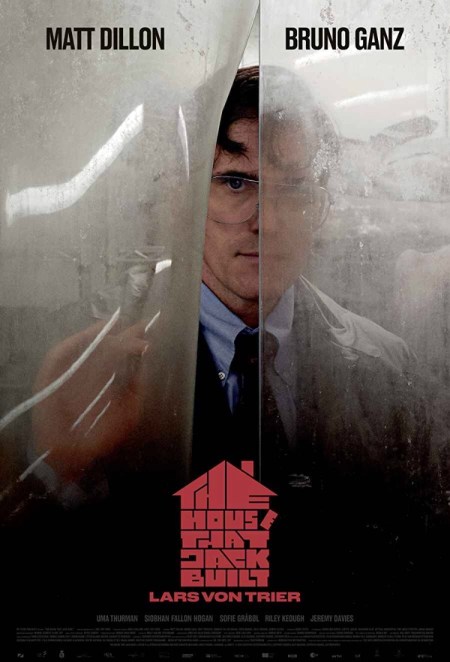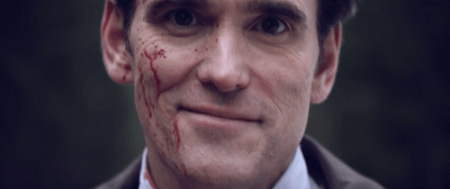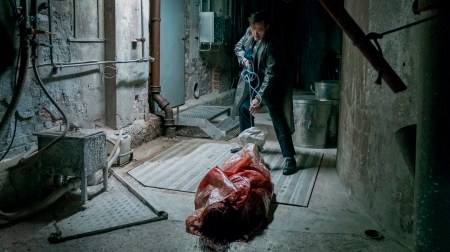The House That Jack Built

Director: Lars von Trier.
Screenplay: Lars von Trier.
Starring: Matt Dillon, Bruno Ganz, Uma Thurman, Riley Keough, Siobhan Fallon Hogan, Sofie Grabøl, Jeremy Davies, Jack McKenzie, Ed Speelers, David Bailie, Emil Tholstrup, Osy Ikhile.
“The old cathedrals often have sublime artworks hidden away in the darkest corners for only God to see. The same goes for murder”
Over the course of five years, Danish provocateur Lars von Trier delivered his “Trilogy of Depression” with AntiChrist in 2009, Melancholia in 2011 and the two-parter Nymphomaniac in 2013. Despite, an extensive career that has always quoted controversy, these three films alone managed to shock and upset viewers and critics alike with graphic scenes of genital mutilation, sadomasochism and full penetrative sex. Since then, von Trier has waited another five years to deliver The House That Jack Built and if you’re wondering if he has anything left to shock you with then wonder no more. Take a moment and a reminder that this film is about a serial-killer and remember that this is Lars von Trier we’re talking about here: the enfant terrible of contemporary cinema.

Plot: A mysterious stranger (Bruno Ganz) debates with failed architect Jack (Matt Dillon) about the murders he has committed. Jack believes his actions have artistic merit and recounts the significant moments over the span of 12 years that led to his development as a serial-killer and how death became an integral part of his existence.

It’ll just get this out the way from the offset and admit that The House That Jack Built is tough viewing. In fact, on many occasions it’s very tough. But, as previously mentioned, what more can be expected when it’s von Trier entering into the dark and depraved world of a psychopath who indiscriminately butchers people? I don’t take pleasure in material of this sort but I’ve always admired von Trier’s approach to filmmaking and whenever I enter into his films, I’m often prepared. That said, I also know von Trier well enough to know that he won’t simply resort to shock tactics without some form of discourse or rumination. He’s not a horror hack where victims are disposed of just to facilitate some deep rooted, psycho-sexual torture porn. Von Trier is too intelligent for that and it’s his ability to reference and explore different themes that make The House That Jack Built a film not easily ignored.
As the film opens, von Trier lays his intentions bare by arguing that there are far deeper reasons at work when it comes to how people respond to works of art or to other people’s behaviours. Our titular character (played with deadpan coldness by Matt Dillon) then goes on to explain to Bruno Ganz’s unnamed conversational partner and debater that each of his killings should be viewed by the work and not the act itself, thereby suggesting that there’s even an art in killing and maiming people. Some of Jack’s most significant killings are then broken down throughout the film in five separate “incidents” and it’s within these incidents that von Trier makes his case in point with a discourse on art, philosophy and violence by discussing the poetry of William Blake, superimposing a Picasso piece over the bludgeoned face of a victim and discussing the similarities of decomposing bodies and The Noble Rot – a process of fermenting grapes to make a fine dessert wine. Von Trier doesn’t stop there, however. Some may remember him being ejected from a press conference and declared “persona non grata” at the Cannes Film Festival in 2011 for his Nazi sympathiser joke and here he makes a direct reference to Nazi concentration camps and an admiration for the German Stuka dive-bombers of WWII. And yet, this is the film where the Cannes jury invited him to return to the festival. It’s all very ironic and absurd and that seems to be the driving force behind von Trier’s intentions here. I couldn’t help but feel that The House That Jack Built is an elaborate joke on his own critics as he addresses each of the criticisms he’s received throughout his career. Whether the joke works or not will depend on your knowledge and understanding of von Trier’s filmography and supposed indiscretions. He’s often been criticised for his treatment of his female characters and in many senses Jack is actually von Trier’s alter ego, allowing him a catharsis and a chance to naval gaze and make self-referential statements on his own films (several of which appear in a brief commentary on art). He even goes as far to reference the recent #MeToo movement about the sexual harassment of women in the workplace and somehow manages to convince, prominent and outspoken campaigner, Uma Thurman to be involved in a telling opening incident. Modern America is then put under the microscope with another disturbing scene involving a mother and her two young children accompanying Jack on a family hunting trip. Each of them are forced to wear read caps that bring reminders of Donald Trump’s “Make America Great Again” slogan as Jack mercilessly makes them the prey in his hunting expedition. In his own words, Von Trier has described the current sociopolitical climate as his influence for the film: “… [it] celebrates the idea that life is evil and soulless, which is sadly proven by the recent rise of the Homo Trumpus – the rat king”.

Some incidents or themes are less subtle than others but there’s no denying the overall impact that von Trier achieves here. It’s a film that can’t simply be written off as gratuitous or exploitative when there are obvious undercurrents and topics to discuss. Each of the murderous incidents have something to say but what’s most impactful is von Trier’s fantastical epilogue where he magnificently recreates Eugène Delacroix romanticist painting of The Barque of Dante before depicting a visually arresting piece on Dante’s The Divine Comedy where Bruno Ganz’s Verge becomes more relevant to Jack’s psyche and the philosophical discussions they shared throughout the film.

As expected, this is another controversial piece of work from Lars von Trier. The material is certainly difficult viewing but it feels like a filmmaker laying his soul bare and also one having the audacity to toy with his critics and put himself front and centre. Von Trier himself might see this as his magnum opus while others might just see a masturbatory pretension where he disappears up his own orifice. Empathising with von Trier or understanding his tortured psyche will be entirely up to the individual viewer and/or any preconceived opinions you have on his body of work. One thing’s for certain, though, von Trier has people talking… again.

Mark Walker
Trivia: The repeated shots in which Jack holds up large cue cards while standing in an alley are a reference to Bob Dylan’s famous music video “Subterranean Homesick Blues”.
December 16, 2018 at 6:12 pm
Lars von Trier is a mighty fine reason to come off a hiatus! Yours is the first review i have read but man this sounds chilling. And wow, now I’ve just remembered i only got through half of his Nymphomaniac double act. I will admit to really struggling to get invested in Part 1. Heard there is more, ehem, payoff in the second.
And it’s pretty cool to see Matt Dillon in a role like this. I haven’t seen him in much for years now.
LikeLike
December 16, 2018 at 6:16 pm
Hey buddy! I actually didn’t have any intention of returning from my hiatus. I initially intended a short Letterboxd review for this but I had so much swirling round my head that when I started writing, I struggled to stop.
This certainly isn’t for everyone and really only those familiar with Von Trier will get what his references are about. It’s a very personal film that actually has a hint of it being his last.
LikeLiked by 1 person
December 16, 2018 at 7:07 pm
Ah man, thats interesting. He has had quite some success riling critics and audiences alike, so maybe I can see how he’d feel ready to stop.
Hey, I hear you on the writing front. There is a position about to open up on Thomas J — always accepting applicants! Hahah! Lately I have become so bored of myself. Yet, I still love the process of seeing a movie and writing about it. A really tricky thing when you get in deep, isnae?
LikeLike
December 16, 2018 at 7:10 pm
He’s a master at pushing people’s buttons and this film seems to focus on all the criticisms he’s endured over the years and attempts to throw some explanation behind them, as well as adding more insults. That’s what I love about von Trier. He’s not out to please anyone.
Yeah, man. I missed blogging but like you, I was getting tired of hearing myself rant. It’s good to take a break and regroup.
LikeLiked by 1 person
December 17, 2018 at 12:22 pm
Nice review Mark. I in fact saw this at Cannes (though not at its infamous premiere but at a press screening the next day), and about a good hundred people walked out of the theater.
I’ve often struggled with Lars von Trier; in the past he’s made good, even great films but especially recently his movies embody a toxic hyper-masculine ideology that presents crassness, misogyny, and bigotry as art. I felt that Jack really embodies all of Lars’ faults and the movie is really just a celebration of his nastiness.
Interesting point about the red caps the family wears, I hadn’t noticed that before. Regardless, I think von Trier subscribes to the same political ideology as Trump (during a press conference, Lars declared that if he killed anyone, it would be a journalist, a statement that clearly reflects of Trump’s condemnations of the “Enemy of the People”). If the scene was meant to be a satire of Trump supporters and the alt-right by subjecting them to the same violence and political nastiness they celebrate, then it just comes across as a hypocritical revenge fantasy (Jack still embraces a Trumpian version of manhood, he just uses that to kill other Trumpers).
If the whole thing was meant to be a prank or a gigantic troll on critics, that Lars is simply playing a parody of his image, makes it more irritating. Michael Haneke can make sadistic movies like Benny’s Video and Funny Games but it’s always been clear he’s against his characters’ cruel, animalistic behavior. Von Trier seems to revel in Jack’s despicableness.
LikeLiked by 1 person
December 17, 2018 at 2:43 pm
Thanks Charles. It was Lars revelling in Jack’s (or his own) despicableness that I liked about the film. I pondered long and hard over whether I liked the film at all but I just couldn’t shake it from head for days and the more I thought on it, the more I was seeing the angle he was going for. It’s almost unashamedly self-congratulatory and I can see why this would irked many viewers but it worked for me as I’ve always really appreciated his work over the years.
I like how he pushes the envelope and tries to shock. Even when we should all aware that he’s like a petulant, prankster we always seem to still fall for it.
LikeLiked by 1 person
December 17, 2018 at 11:34 pm
I’m curious, did you happen to see the director’s cut? I know they’re distributing that to a few theaters here in the US, but I don’t know if they’re doing that internationally.
LikeLiked by 1 person
December 17, 2018 at 11:59 pm
No, it wasn’t the directors cut I saw. I’ll give that a look if I get a chance but apparently it’s just more unsettling material and doesn’t add much to the overall themes.
LikeLike
January 4, 2019 at 5:58 am
Great to see you reviewing again Mark. This was one mightily impressive write up.
LikeLike